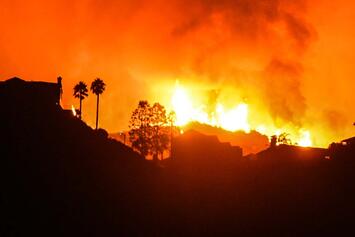
The fire still engulfing large swaths of Los Angeles has done more than destroy homes, businesses, and livelihoods. It has scorched the whole dream of Los Angeles, part of a downward spiral unfolding for a generation — and cast into severe doubt the city’s ability to host the 2028 Olympics.
Fires have been a reality in California for at least 20 million years. In my own, far shorter lifetime, I have seen numerous blazes, and covered several on television. They aren’t predictable, but you know when they are likely to occur. They aren’t preventable, but you can be prepared for them. Fires, floods, and earthquakes — disasters are us, and that has been the case as LA grew over the past century.
This time around, city and state leaders bear a heavy blame for a shocking lack of preparation, given weather conditions that were well predicted and have caused disasters in the past. As Traci Park, a member of the City Council, recently suggested, the fires revealed “chronic underinvestment in our critical infrastructure”. Perhaps the most remarkable failure was the lack of pressure to get water out of hydrants.
This disaster reflects the failure of the one-party progressivism currently dominating governmental structures. In this worldview, basic infrastructure is less important than addressing climate change and “social justice”; measures such as building dams or hardening the electric grid are demoted to a secondary role, with catastrophic effects.
While the fire may not reverse this mentality, it has demolished the reputations of two major adherents: LA Mayor Karen Bass and California Gov. Gavin Newsom. Even as federal authorities warned of fires, Bass elected to take a junket to Ghana at the behest of President Biden. She came back to a city ablaze, with thousands of Angelinos having lost their homes and businesses.
“Everything in the city — from parks to schools — seems worn and in a state of ill repair”.
During her tenure, Bass, whose political icon was Fidel Castro, had cut the fire department budget, signed off on lavish, and largely unsuccessful, programmes to address homelessness, and crowed about how the city would defend illegal immigrants. Meanwhile, everything in the city — from parks to schools — is worn and in a state of ill repair.
Nor has this regime done much for its poorer residents, which it claims to care most about. LA suffers among the highest poverty rates in the state and the worst in the country. South-central LA, the epicentre of two of the worst riots in American history, is now poorer in relation to the rest of the city than before those upheavals. It remains the second worst homeless capital of America and builds far fewer new housing per capita than almost every other large US metro area. The city still wants to raise taxes amid a deepening budget hole.
Read the rest of this piece at Unherd.
Joel Kotkin is the author of The Coming of Neo-Feudalism: A Warning to the Global Middle Class. He is the Roger Hobbs Presidential Fellow in Urban Futures at Chapman University and and directs the Center for Demographics and Policy there. He is Senior Research Fellow at the Civitas Institute at the University of Texas in Austin. Learn more at joelkotkin.com and follow him on Twitter @joelkotkin.
Photo: Ryan Babroff, via Flickr, under CC 4.0 License.












